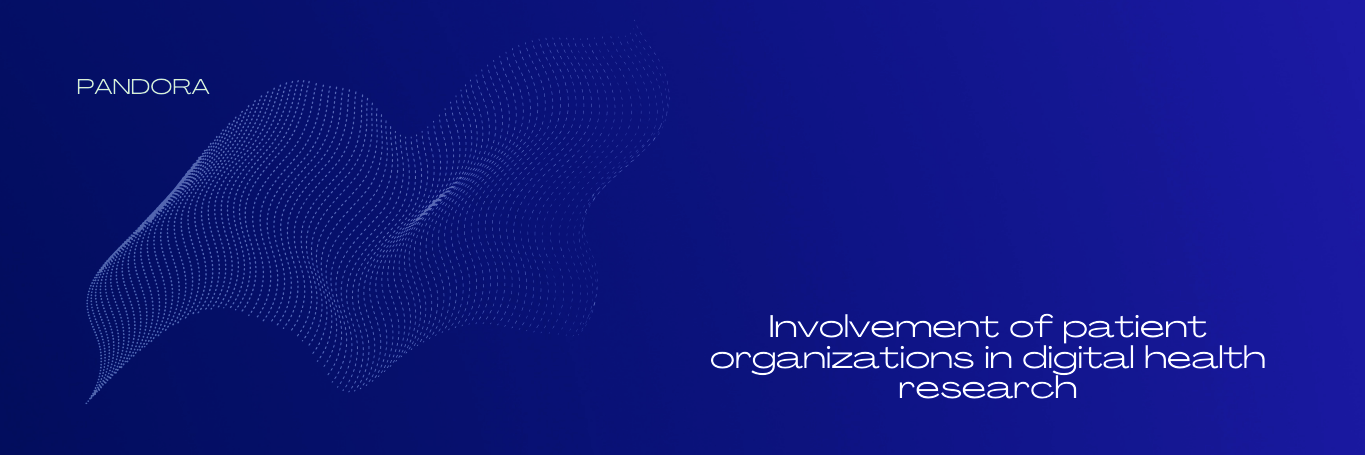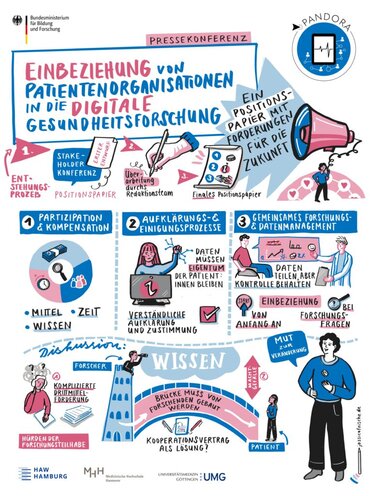
Patient-Oriented Digitalization: An Ethical Analysis of the Role of Patient and Self-Help Organizations as Stakeholders in the Context of Digitalization in Health Research and Care (PANDORA)
Department of Medical Ethics and History of Medicine

Funding: BMBF (Bundesministerium für Bildung und Forschung)
Project Management: HAW Hamburg (Hochschule für angewandte Wissenschaften Hamburg)
Duration: Dezember 2021 – April 2025
In Subproject 1 carried out by:
- Prof.*in Dr. Silke Schicktanz
- Dr. Jan Hinrichsen
- Karina Korecky, M.A.
Background
The project "PANDORA - Patient-Oriented Digitalization" is a collaborative research initiative funded by the BMBF (Bundesministerium für Bildung und Forschung). It is led by the HAW Hamburg (Hochschule für angewandte Wissenschaften Hamburg) in cooperation with the MHH (Medizinische Hochschule Hannover) and the UMG (Universitätsmedizin Göttingen). Together, the project brings expertise in applied and empirical ethics, medical anthropology, public health, and public patient involvement research.
Patient organizations (PO) and self-help organizations (SHO) are increasingly turning to digital tools in their work. Therefore, the PANDORA research network has analyzed the ethical and social aspects of digitalization in healthcare and related research. Central to this were digitalization projects and research where POs and SHOs were involved as stakeholders and co-researchers. For this analysis, the research team collaborated with representatives from various POs and SHOs.
The development of different formats aims to improve the participation of POs and SHOs, as well as the digital health literacy of those affected and the general public.
Results

The “position paper”
At the conclusion of the project, a “position paper” was published regarding the involvement of patient organizations in digital health research. This document was developed during the first nationwide stakeholder conference in Germany.
The position paper serves as a strategic document for successful collaboration between researchers and patients as co-researchers.
The development process occurred in three stages:
- First Stage: A conference held on June 3-4, 2024, in Hamburg focused on health research with the title "Shaping Digital Health Research Together". Representatives from nearly 30 patient and self-help groups gathered there. Together with the PANDORA research team, they worked on the initial draft of the position paper.
- Second Stage: A team, in consultation with conference participants, finalized the position paper.
- Third Stage: The completed position paper was presented to the public and policymakers on November 12, 2024, in Berlin.
The position paper outlines four key demands for health policy:
- The first demand is to ensure involvement in research projects. This aims to bridge the gap between research and patient organizations. To achieve this, patient organizations need financial resources, clear structures, defined tasks, and appropriate technology.
- The second demand is the strengthening of skills necessary to engage in discussions and decision-making. This requires patient representatives and researchers to clarify their respective issues and needs.
- The third demand focuses on increasing understanding and trust. It calls for the recognition that health data belongs to the patients. The terms of data collection for research purposes should be explained simply and clearly, including the purpose of storage, data security, and accountability.
- The fourth demand emphasizes the importance of involving patient organizations in the research process, with clear agreements on collaboration. Patient organizations should be able to contribute their expertise and experience to the research, and they should also have opportunities to learn research methods in order to engage more actively in the research process.
The Podcast
To ensure the practical transfer of insights and knowledge gained, the PANDORA project developed a podcast series on the topic "Digital Paths in Healthcare: Focus on Ethics, Patient and Self-Help Organizations," with significant contributions from the UMG. The podcast is available both on the website and on all major podcast platforms: Spotify, Amazon, Deezer, Apple
Subprojects
Subproject 1 (SP1)
The first study of Subproject 1 (SP1) began in September 2022 and focused on the topic "Ethics and Digitalization in Healthcare." In this interview-based study, representatives and members of various patient organizations were surveyed to capture patients' attitudes, experiences, and assessments regarding issues such as electronic patient registries, the use of apps for health management, and consent for the use of data in medical research.
The UMG (Universitätsmedizin Göttingen) and the Hamburg University of Applied Sciences HAW Hamburg (Hochschule für angewandte Wissenschaften Hamburg) collaborated with the aim of understanding the relevant value conflicts experienced by patient organizations and patients in the context of digitalization projects.
Based on this, practical-ethical, social, and communication strategies were to be developed that would promote the avoidance of value conflicts and support the representation of patient interests in digitalization projects. Interviews and a systematic ethical analysis were conducted for this purpose.
The results contributed to the development of an online survey (SP2) and were published in various formats, such as scientific papers or a podcast (SP4) for patients.
Subproject 2 (SP2)
The project team from the MHH (Medizinische Hochschule Hannover) was responsible for conducting qualitative interviews and a quantitative online survey as part of a mixed-methods approach. The aim of these studies was to capture the perspective of patient and self-help organizations, as well as their members, on the digitalization processes in healthcare and their active involvement in such initiatives. The study sought to identify experiences, attitudes, and possibilities concerning participation activities. The results of the survey were used to develop ethical evaluation criteria and recommendations for digitalization processes. Additionally, the results were published.
Subproject 3 (SP3)
The UMG (Universitätsmedizin Göttingen) explored how patient organizations perceive the ethical challenges of digitalization and how they attempt to address these issues independently and was primarily responsible for conducting focus groups with representatives of patient organizations to better understand their views on digitalization issues. The study aimed to identify what patient organizations consider to be appropriate governance for digitalization projects.
The UMG also developed a catalog of criteria for the ethical evaluation of such issues, which was supplemented by the teams from SP1 and SP2.
Subproject 4 (SP4)
The HAW Hamburg (Hochschule für angewandte Wissenschaften Hamburg) serves as the coordinating office for the project and is responsible for transferring the insights and knowledge gained into practice. Examples of these transfer formats include the project website and the podcast, which was developed with significant contributions from the UMG.